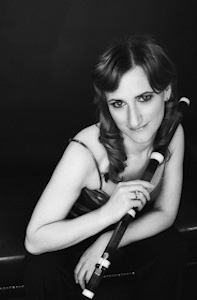“They’ll learn to like it someday” is the Beethoven quote that Associate Music Professor Mary Oleskiewicz has hanging in her office. As a child, Oleskiewicz knew she had a heart for music. Now, as the recipient of several awards and international recognition, she is the star performer of her own show.
Oleskiewicz’s mother was a classical music lover. She listened to Chopin and Beethoven, to name a few. Her parents got her a piano and she took lessons, but didn’t like them. Then, in the fourth grade, her neighbor got a flute and she begged her reluctant parents to buy her one. They didn’t think she’d practice, but “I was ready prove them wrong,” Oleskiewics recalls – and she did.
As an undergrad, Oleskiewicz attended Dana School of Music in Ohio. While there, at the request of a professor, she bought a historical baroque flute. She has been playing it ever since.
What is a historical baroque flute? A windwood instrument made of either metal or wood, also known as the Western concert flute. The instrument was common in the Romantic Baroque period.
Oleskiewicz taught herself how to play it, and she now specializes in the works of Johann Joachim Quantz and Johann Sebastian Bach. She received her Ph.D. in Musicology from Duke and came to UMass Boston because of the university’s willingness to support her work. Besides the East Coast being a big music scene, she was able to mix her musicology with performance.
Oleskiewicz is also interested in tango. In comes QTANGO: a nationally known dance orchestra troupe, of which she is a member.
Not only does she play the flute for QTANGO, she has been performing as an Argentine tango dancer since 2005. “I come out at night,” she said, laughing.
Oleskiewicz used to want to be a ballerina, but tango satisfied her interest in the arts. Through her experience, she has been able to teach her students that music isn’t just about listening – it is about understanding. She believes that this understanding is the reason a large amount of people do not like classical music – because it is too long, too complex and too haughty.
Keeping this in mind, Oleskiewicz strives to make a connection between the music her students listen to and Antonio Vivaldi and Bach, among others, like a “gentle immersion.”
“You don’t have to ‘like’ it, you just have to understand,” Oleskiewicz said to her Intro to Music class. Three minute digital pieces of music lack visceral quality. Classical music was created to provoke energy. It requires a greater attention span. “Many people are surprised to see how hard music is,” she said.
Oleskiewicz explained it this way: When you listen to music on an iPod or on the radio, you may think, “This should be easy.” Watching someone perform however, sweat dripping down his brow as he tries to convey a message without words, is another thing.
Oleskiewicz would know. Not only is she a performer, but also a researcher. She recounts spending endless hours going over hundreds, if not thousands of ancient pieces not well known, or even heard of.
The construction on campus brings her hope. The new General Academic Building No. 1 promises a to be a good environment for music enthusiasts around the campus. There are plans to have a recital hall, which is “a positive step forward to bring back music,” Oleskiewicz said.
If you have a taste for classical music, mark your calenders for 8 p.m., April 2, at the 2nd Church in Newton. There, along with other leading Boston musicians, Oleskiewicz will be performing Bach by candlelight, a set of emotionally intense pieces sure to captivate the imagination in all of us.
Support is garnered through donations, and any amount is welcome.





















































